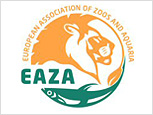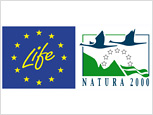Today Fota Wildlife Park announced the birth of three endangered baby Ring-tailed lemurs and two baby Black and white colobus monkeys, born as part of breeding programmes for threatened species in European Zoos.
Fota Wildlife Park has been involved in species conservation since it opened in 1983, 40 years ago. To mark this anniversary, Fota Wildlife Park is bringing back a live programme of events for Easter including Wildlife Talks, Animal Feedings Times and Live Workshops.
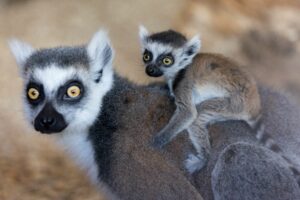
Back in 1983, the Ring-tailed lemur was listed as Least Concern (LC) on the IUCN Red List despite being legally trapped for its fur and food. In 2020, the Ring-tailed lemur’s IUCN status was upgraded to Endangered due to the wild population declining and less than 8 subpopulations of 100 animals. There are now less than 2000 Ring-tailed lemurs left in the wild. Currently there are more than 2000 captive bred (ex situ) Ring-tailed lemurs in zoological parks throughout the world, which form an insurance population against extinction of the species in the wild.
March has been a busy month in Fota Wildlife Park with the birth of five new monkeys.
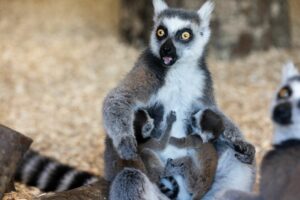
Lead Ranger, Teresa Power said,
“We are absolutely delighted with the birth of three male Ring-tailed Lemur babies, which is an endangered species. Aqua, who was born in 2016, gave birth to twins on March 11th and Brida, who was born in 2017, gave birth to one baby on March 17th.
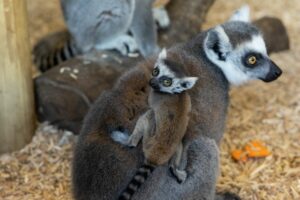
She continued, “These are very important births as the Lemur population on their native Island of Madagascar has been declining alarmingly. The Ring-tailed Lemurs can be seen by the public in the ‘Madagascan Village’, a purpose-built habitat, designed to house the endangered lemurs and highlight the plight of biodiversity on the Island of Madagascar, which has lost 90% of its forests cover in the last 200 years, and 80% of animal and plant life there faces extinction.”
The Ring-tailed Lemurs have been-ever present at Fota Wildlife Park since it opened its gates 40 years ago in 1983. Fota Wildlife Park has long valued the importance of international breeding programmes and many of their young lemurs have taken part in breeding programmes in wildlife parks and zoos across the globe.
The baby lemurs Mums both arrived at Fota from the Wildlands Adventure Zoo Emmen in the Netherlands in 2019 as part of a new breeding group. Merlot, the father of the babies, who was born in 2020; arrived in June last year from France.
On March 9th and March 15th, two baby Black and white colobus monkeys were also born in Fota Wildlife Park. With their beautiful white coats they resemble baby lambs. Their mothers who were born in 2017 came from Bonjnice Zoo in Slovakia and their father Tom who was born in 2006 came to Fota Wildlife Park from Belfast Zoo in 2011.
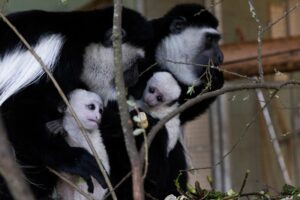
Lead Ranger Teresa Power said, “Even at this young age the baby colobus monkeys are very active, and they can be viewed jumping and climbing through the viewing window of their house just inside the main entrance to Fota Wildlife Park. They will be introduced to the outdoor habitat in the coming weeks once the weather improves.
It is interesting for us to see that the baby colobus monkeys are learning what their mothers eat by watching them closely as they pick up various pieces of food mainly leaves and vegetables.”
The Black and white colobus are distinctive looking animals with a long mane of black and white hair, Native to the tropical forests of Africa. The native habitat of Colobus monkey is threatened by agricultural developments and timber production.
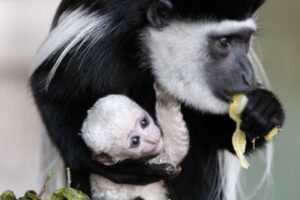
Over the next two weeks, visitors can take part in an interactive workshop on plants and biodiversity with Peter Dowdall, learn about the wonders of the animal world with daily wildlife talks hosted by the Education Department in Fota Wildlife Park, watch the rangers as they feed the animals in the Park and enjoy award winning Learnit Lego workshops. All events are free with the admission to the Park and full details are available here.
~
Photo Credits – Darragh Kane

